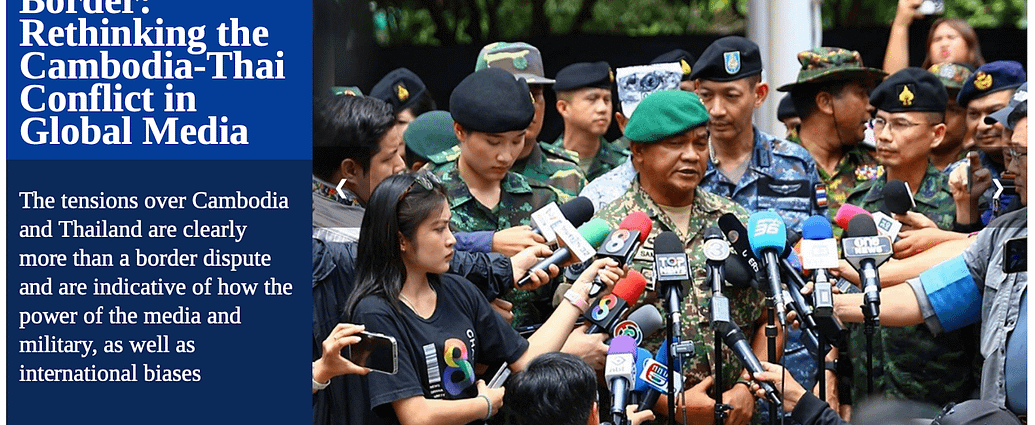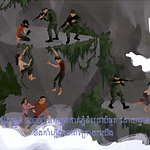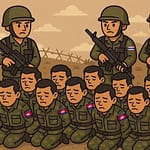The tensions over Cambodia and Thailand are clearly more than a border dispute and are indicative of how the power of the media and military, as well as international biases, can threaten truth and silence the authentic voice of the people. While Cambodia and Thailand have links with a shared centuries-long history, the notion of territorial tensions has been stoked by the elites not only in both countries but also by the lens of the media outlets that privileged one side of the story.
Thai Media and Nationalist Propaganda
The media in Thailand often amplifies the military and monarchical voice. When the media reports on border disputes, they are treated as existential threats and their journalism is more of a facilitator to nationalistic sentiments, rather than a balanced sentiment. Thailand is exceptional in this regard, as they have led the world in successful military coups, and the generals have twisted border issues with Cambodia and Laos into means for political action and to create a political threat to consolidate power over domestic issues.
Such provocations serve to distract the public from mobilising around contested political discourse and political issues at home. Prime ministers are not resigning through the ballot box, but for their domestic actions that the military disagrees with or through pressure from the palace. The cycle reinforces a disdain for democracy while rationalising a political threat for the out of touch and the mobilisation around patriotism that extends to the Cambodian borders.
However, this discourse about Cambodia is not an accurate representation of what many citizens in Thailand likely aspire. In the last round of elections, youth across the country supported Pita Limjaroenrat, the leader of the reformist Move Forward Party, whose campaign thrust was concentrated on democracy, accountability and economic opportunity.
His election demonstrates that the new generation of Thais likely do not aspire for war with Cambodia (or anyone else) nor to define their country under royalist authoritarianism; they want reform.
Global Media Bias
This problem is not unique to Thailand; international media often favours the stronger actor’s narrative over that of its weaker neighbour, often at the expense of visibility for the latter: Reuters, Al Jazeera and other outlets regularly framed conflicts in a way that favours Thailand by portraying Cambodia as the secondary player in its own story, which is characteristic of broader trends such as Israeli security narratives eclipsing Palestinian suffering in the Palestine–Israel conflict or Western perspectives dominating coverage in Ukraine while others remain obscure.
The experience of Cambodia with respect to Thailand fits this pattern: The weaker state loses its position and becomes a secondary actor; the stronger actor frames the narrative, and its framing gains legitimacy.
Cambodia’s Democratic Challenges
Critics are quick to suggest that Cambodia has failed as a democracy.
They claim that independent journalists have been expelled in recent years, opposition parties have been shuttered and elections have been turned into empty exercises. These points make it difficult for Cambodia to claim credibility abroad.
But the government of Cambodia is not its people. Frequently, international media fail to distinguish the domestic political atmosphere from the will of the Cambodian people.
Like their Thai neighbours, ordinary Cambodians want peace, dignity and justice.
In removing their voices, the global story perpetuates the injustices it claims to critique.
The Army Behind the Curtain
Thailand’s domestic politics informs much of its external image. The army has been the de facto ruler for decades. Civilian politicians who fail to heed the military and royal desire are quickly ousted. And at the centre of this structure stands the monarchy, shielded by some of the most draconian lèse-majesté laws in the world.
Border disputes with Cambodia, particularly over culturally sensitive sites such as Preah Vihear, have been attractive levers for this elite compact. By whipping up nationalist anger, the military legitimises its ongoing supremacy, presenting itself as the protector of national identity. But in doing so, it undermines democracy at home and peace in the region.
Toward Justice and Balance
The Cambodia–Thai dispute is about more than lines on a map. It reveals how, in truth, propaganda and power distort reality and global prejudice muffle the voices of weakness.
For Cambodia, this would require that it address its own governance shortfalls while insisting that its people’s aspirations be acknowledged. In the case of Thailand, it means liberating itself from the cycle of military interventions and nationalist prescriptive influence.
The lesson for the global media is unmistakable: bias is not neutral. It erodes peace and sustains injustice by continuously giving preference to strong states and institutions. Thais and regular Cambodians are not adversaries. They are citizens who want stability, justice and dignity, goals that will elude them until the whole truth about this conflict is revealed.
In my view, even when there are forces, economic or diplomatic imbalances between parties, the truth is still truth until it finds you and you discover how unfair the world can be; then all you have left is to do justice to your own mind and that is where real peace comes from.
Policy Takeaway
In order to prevent nationalist manipulation of border disputes, ASEAN and international media outlets must encourage fair reporting. Without this change, democracy and regional stability will continue to be undermined by the cycle of militarism and bias.
This article was originally published in The Phnom Penh Post. It is republished here with proper attribution. You can read the original version: https://www.phnompenhpost.com/opinion/bias-and-border-rethinking-the-cambodia-thai-conflict-in-global-media







